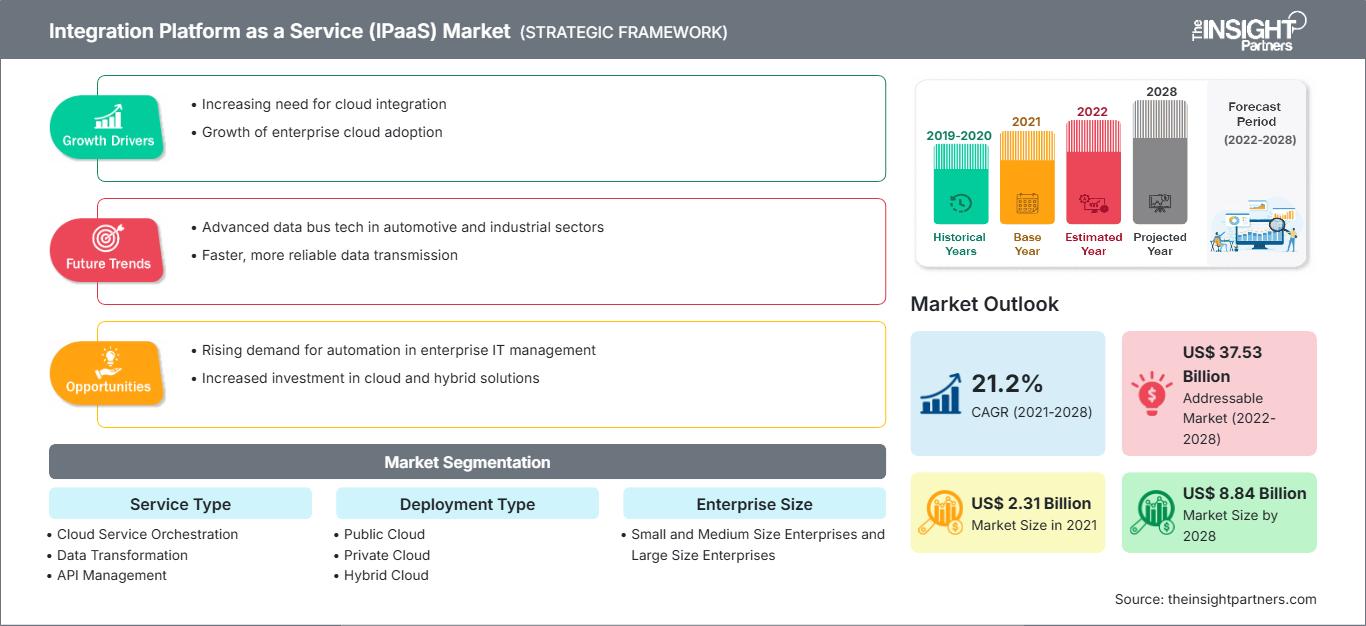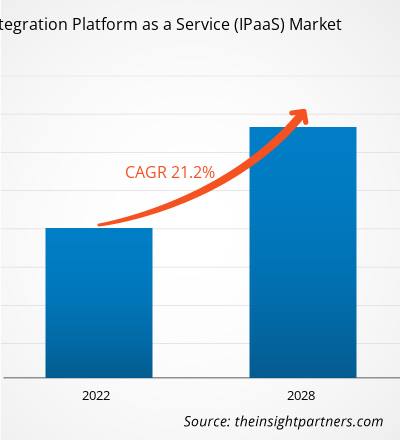The integration platform as a service (IPaaS) market was valued at US$ 2,306.32 million in 2021, and it is projected to reach US$ 8,844.20 million by 2028; it is expected to grow at a CAGR of 21.2% from 2021 to 2028.
Rise in importance of cloud real-time monitoring across businesses is boosting the demand for the integration platform as a service. The security and performance of the network can have a big impact on a company's overall success. Hence, every company, especially those in the e-commerce industry, needs to keep an eye on its networks on a regular basis to ensure everything is functioning well. They need have a strong understanding of what real-time network monitoring is and how it may benefit their business in order to have a clear image of how the systems are doing. The use of apps and tools that track and record continuous snapshots of the network's overall performance is known as real-time monitoring. Real-time monitoring is used by businesses to keep track of network activities, improve network security, and spot possible problems as soon as they happen. Every company, regardless of size, may benefit from real-time network monitoring.
Additionally, cloud real-time monitoring services allow businesses to shorten the time it takes to respond to incidents. It is critical for organizations to deal with issues as soon as they occur, no matter how minor they appear to be. For example, it may seem self-evident to respond swiftly to a cyberattack or data breach, but even seemingly little issues like a slow-loading website or an abundance of 404 webpages can have a significant impact on businesses. Real-time network monitoring can help the companies catch these events as soon as they happen and respond quickly. As a result, the adoption of cloud real-time monitoring services is contributing to the market's growth over time.
Customize This Report To Suit Your Requirement
You will get customization on any report - free of charge - including parts of this report, or country-level analysis, Excel Data pack, as well as avail great offers and discounts for start-ups & universities
Integration Platform as a Service (IPaaS) Market: Strategic Insights

-
Get Top Key Market Trends of this report.This FREE sample will include data analysis, ranging from market trends to estimates and forecasts.
Impact of COVID-19 Pandemic on Integration Platform as a Service (IPaaS) Market
The unprecedented rise in number of COVID-19 cases across the globe and the subsequent lockdown to combat the spread of the virus in the first two quarters of 2020 have led to numerous businesses to come on a standby situation. In 2020, technological investments experienced a dip, owing to the above-mentioned reasons. However, the COVID-19 pandemic has accelerated the work from home scenarios across the globe, thereby influencing the companies to adopt cloud servers for smooth functioning of business operations remotely. In late 2020, global companies experienced a rise in investment in cloud solutions in order to facilitate easy remote working. Thus, the rising adoption of cloud solutions and platforms across all organizations in the globe is expected to influence the rise in demand for platform integration services market, thereby contributing to the growth of the market over the forecast period.
Market Insights–Integration Platform as a Service (IPaaS) Market
Growth in Adoption of Hybrid and Multi-Cloud Infrastructure
It is anticipated that, in the coming years, various organizations will adopt hybrid and multi-cloud strategies, as these systems are trending in the relevant sectors. Organizations are expected to opt for these strategies as they are reluctant to depend on a single cloud vendor. According to IBM Corp., 98% of organizations are planning to utilize multiple hybrid clouds by 2021. Hybrid cloud provides the benefits of both public and private clouds, by enhancing flexibility to work between both the cloud solutions. Further, it enables organizations to protect their confidential data by storing it into the private cloud, and simultaneously use the public cloud for storing public data. The requirements of specific applications and functions will differ with the increase in specialized services. This, in turn, encourages the business managers to opt multi-cloud and hybrid solutions to run the system effectively and efficiently. Moreover, it is cost-effective, and it mitigates the risk of business loss. The adoption of hybrid cloud will also influence the integration platform as a service (IPaaS) market growth. The hybrid model will require proper integration to ensure smooth business functioning over the course of time, thereby contributing to the market growth.
Service Type-Based Insights
Based on service type, the integration platform as a service (IPaaS) market is segmented into cloud service orchestration, data transformation, API management, data integration, real- time monitoring and integration, business-to-business and cloud integration, deployment type integration, and others. The cloud service orchestration segment held the largest market share in 2020.
Players operating in the integration platform as a service (IPaaS) market are mainly focused on the development of advanced and efficient products.
- In April 2021, Informatica had announced a cloud platform that employs microservices and an AI engine to combine data management capabilities and enable data and application programming interface (API) integration.
- In August 2019, MuleSoft, provider of the leading platform for building application networks, announced the availability of MuleSoft Government Cloud, a cloud deployment environment that combines integration platform as a service (IPaaS) and full lifecycle API management in a single runtime. By deploying MuleSoft’s Anypoint Platform within the Government Cloud environment, agencies can develop, manage, and monitor all their integrations and APIs from a unified, secure, cloud-based platform, thereby simplifying operations and increasing IT agility.
The integration platform as a service (IPaaS) market has been segmented as follows:
Integration Platform as a Service (IPaaS) Market – by Service Type
- Cloud Service Orchestration
- Application Integration
- API Management
- Data Integration
- Business-to-Business and Cloud Integration
- Real-Time Monitoring and Integration
- Data Transformation
- Others
Integration Platform as a Service (IPaaS) Market – by Deployment Type
- Public Cloud
- Private Cloud
- Hybrid Cloud
Integration Platform as a Service (IPaaS) Market – by Enterprise Size
- SMEs
- Large Enterprises
Integration Platform as a Service (IPaaS) Market – by Industry
- IT and Telecommunications
- BFSI
- Manufacturing
- Healthcare
- Consumer Goods and Retail
- Energy
- Government and Public Sector
- Others
The regional trends and factors influencing the Integration Platform as a Service (IPaaS) Market throughout the forecast period have been thoroughly explained by the analysts at The Insight Partners. This section also discusses Integration Platform as a Service (IPaaS) Market segments and geography across North America, Europe, Asia Pacific, Middle East and Africa, and South and Central America.
Integration Platform as a Service (IPaaS) Market Report Scope
| Report Attribute | Details |
|---|---|
| Market size in 2021 | US$ 2.31 Billion |
| Market Size by 2028 | US$ 8.84 Billion |
| Global CAGR (2021 - 2028) | 21.2% |
| Historical Data | 2019-2020 |
| Forecast period | 2022-2028 |
| Segments Covered |
By Service Type
|
| Regions and Countries Covered |
North America
|
| Market leaders and key company profiles |
|
Integration Platform as a Service (IPaaS) Market Players Density: Understanding Its Impact on Business Dynamics
The Integration Platform as a Service (IPaaS) Market is growing rapidly, driven by increasing end-user demand due to factors such as evolving consumer preferences, technological advancements, and greater awareness of the product's benefits. As demand rises, businesses are expanding their offerings, innovating to meet consumer needs, and capitalizing on emerging trends, which further fuels market growth.

- Get the Integration Platform as a Service (IPaaS) Market top key players overview
Integration Platform as a Service (IPaaS) Market – by Geography
-
North America
- US
- Canada
- Mexico
-
Europe
- Germany
- France
- Italy
- UK
- Spain
- Switzerland
- Rest of Europe
-
Asia Pacific (APAC)
- Australia
- China
- India
- Japan
- South Korea
- Rest of APAC
-
Middle East & Africa (MEA)
- Saudi Arabia
- UAE
- South Africa
- Rest of MEA
-
South America (SAM)
- Brazil
- Argentina
- Rest of SAM
Integration Platform as a Service (IPaaS) Market – Company Profiles
- Informatica
- elastic.io
- Software AG
- Seeburger AG
- Mulesoft, LLC
- SAP SE
- Oracle Corporation
- SnapLogic.
- IBM Corporation
- Microsoft Corporation
- Boomi, Inc
Frequently Asked Questions
Which Deployment type-based segment has the largest market share in 2020?
What are the market opportunities for IPaaS market?
What are the driving factors responsible for the growth of IPaaS market?
The high adoption of cloud solutions and platforms among businesses, owing to their advantages over on-premise solutions, is influencing the growth of the integration platform as a service (IPaaS) market.
- Historical Analysis (2 Years), Base Year, Forecast (7 Years) with CAGR
- PEST and SWOT Analysis
- Market Size Value / Volume - Global, Regional, Country
- Industry and Competitive Landscape
- Excel Dataset
Recent Reports
Testimonials
Reason to Buy
- Informed Decision-Making
- Understanding Market Dynamics
- Competitive Analysis
- Identifying Emerging Markets
- Customer Insights
- Market Forecasts
- Risk Mitigation
- Boosting Operational Efficiency
- Strategic Planning
- Investment Justification
- Tracking Industry Innovations
- Aligning with Regulatory Trends





















 Get Free Sample For
Get Free Sample For